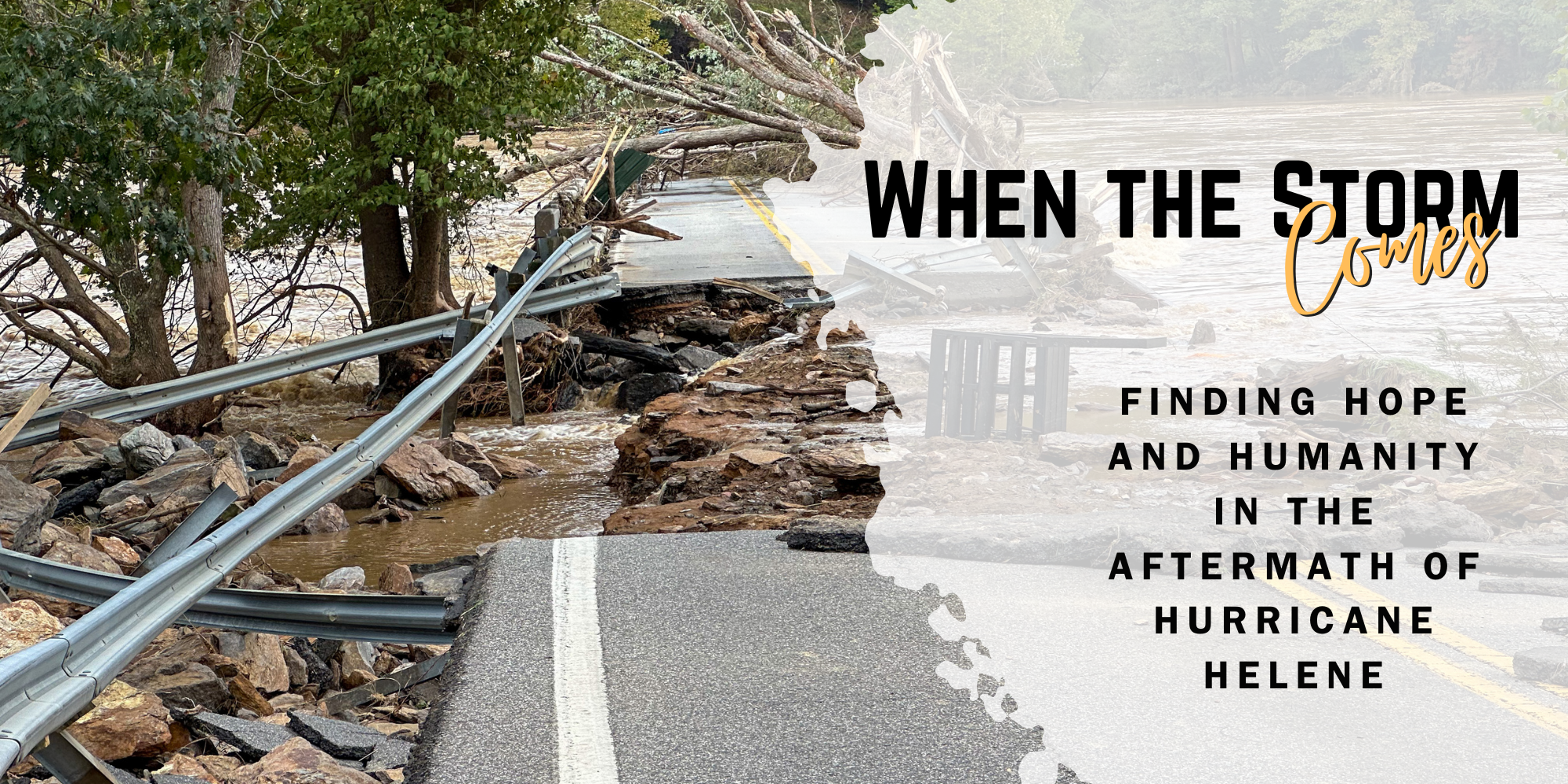Community resilience in times of crisis is something words alone can’t capture, but it’s what I’ve witnessed since Helene stormed through Western North Carolina. The winds, mudslides, and floods left destruction, devastation, death, and despair behind. Homes and businesses were seriously damaged or washed away. Basic utilities—electricity, phone service, and water—disappeared. People drowned, sometimes in the helpless sight of their loved ones. For long days and nights, the screaming of sirens and the whirring of helicopters filled the air as first responders worked to rescue those who were stranded, injured, and sick. Five weeks later, what I see still gut-punches me and brings tears to my eyes. I hear the groaning and grieving—the sighing and searching—that mere words can’t name.
The Outpouring of Compassion
At the same time, thank God, words also fall short of describing the outpouring of compassion we’ve experienced. Mr. Rogers famously said: “When I was a boy and I would see scary things in the news, my mother would say to me, ‘Look for the helpers. You will always find people who are helping.’” Since shortly after the storm, helpers from nearby and far away have been nearly everywhere: nonprofit and religious organizations; FEMA, the Army Corps of Engineers, the NC National Guard; utility repair crews; and state and local government agencies. Volunteers, many of them residents who themselves lacked electricity and water, showed up day after day at supply distribution sites. They’re still showing up. Because of the good work of these helpers, porta-potties, pallets of bottled water, free hot meals, shower and laundry trailers, Wi-Fi hotspots, and temporary shelters became ordinary-extraordinary signs of hope.
Neighbors Helping Neighbors
Neighbors shared with neighbors. In our small subdivision, a neighbor with a rain barrel shared water we could use to flush our toilets. A couple with a generator set up a device-charging station in their driveway. We sat around those plugs like campers around a fire, telling stories and sharing information about where a cell signal could be found or a grocery store was open. As we waited for our computers to charge, I got to know one of my neighbors who’s a journalist and book-reviewer with a delightful sense of humor. Our next-door neighbors opened their home and their freezer for neighbors to shop-for-free for food that was beginning to thaw. Another neighbor went to several homes to show folks how safely to draw potable water from their water heaters. A lot of us spent more time outside, talking with one another in the street, because we simply needed to be with one another.
Among our neighbors and across our region, there has been, and is, an often-wordless flow of love and mercy. The storm made it unmistakable that we depend on each other and caused us to trust, at least for a while, that we could count on each other.
The Contrast of Crisis and Campaign Season
The weeks since the storm have coincided with the final stretch of a bitter and bruising election campaign season. Most political rhetoric makes it more likely that we will stand against, rather than with, each other. It doesn’t heighten compassion; it deepens division. It raises othering, not neighborliness; it generates suspicion, not trust.
Unity in Vulnerability and Service
It’s ironic and instructive that, as far as I know, no one asked a first responder about her party affiliation before accepting her help, or checked the bumper stickers on the chainsaw-wielding, camo-wearing man’s truck before welcoming his work to get a tree off the roof, or debated doctrine with teams of volunteer cooks who were serving free meals from a Christian organization’s food truck. It didn’t matter whether the strugglers or the helpers were Republicans or Democrats; conservatives or liberals; Christians or Jews or Muslims or spiritual-but-not-religious; or long-time citizens or recent immigrants.
For a time, shared vulnerability and mutual mercy caused us not to see one another through red- or blue-tinted lenses or to reduce one another to the caricatures of social-media memes. As a Jesus-follower, I would put it this way: we saw each other as bearers of God’s image, as beloved children of God, and as living icons of Jesus. We perceived that when we served one another, we served with him and served him: “Just as you did it to one of the least of these brothers and sisters of mine, you did it to me.”
Love in the Face of Crisis
The remarkable Dorothy Day, founder of the Catholic Worker Movement, was eight years old in 1906 when a massive earthquake struck San Francisco. She said: “What I remember most plainly about the earthquake was the human warmth and kindness of everyone afterward . . . While the crisis lasted people loved each other.” What if we remembered that every day, we encounter people who are in crisis of some kind? There are silent and invisible storms: broken relationships, shattered dreams, and frayed emotions. Lethal loneliness. Shackling addiction. Frightening pointlessness.
I want to remember that we’re all, always, vulnerable in some way, and we can all, almost always, help each other.

Thank you for sharing. The division has been a hard thing for me. In my own home we are divided. It’s a great reminder about what really matters.